BMP6004: Organisational Learning vs Learning Organisation Analysis
VerifiedAdded on 2023/06/18
|13
|3098
|73
Report
AI Summary
This report critically evaluates the differences between organisational learning and a learning organisation, exploring their characteristics, importance, and the role of learning development theories. It discusses how organisational learning focuses on knowledge acquisition and skill development within a business entity, while a learning organisation emphasizes creating favorable working conditions, fostering competitive advantage, and achieving overall organisational development. The report further explains learning development theories such as classical conditioning and cognitive theory, highlighting their application in enhancing organisational learning and development. It concludes by emphasizing the importance of these concepts in achieving organisational success and adapting to the dynamic business environment, providing a comprehensive overview of learning and development strategies.
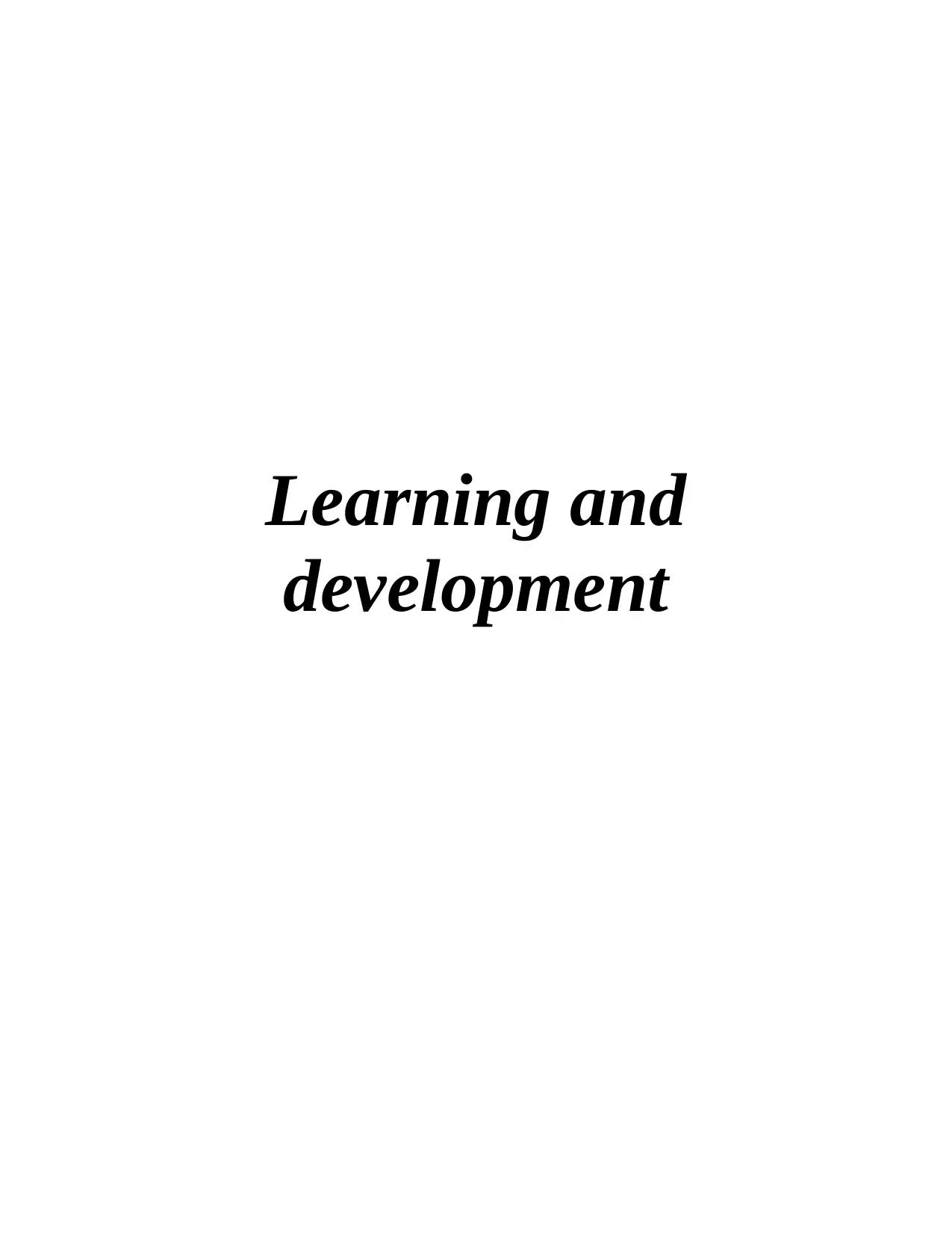
Learning and
development
development
Paraphrase This Document
Need a fresh take? Get an instant paraphrase of this document with our AI Paraphraser
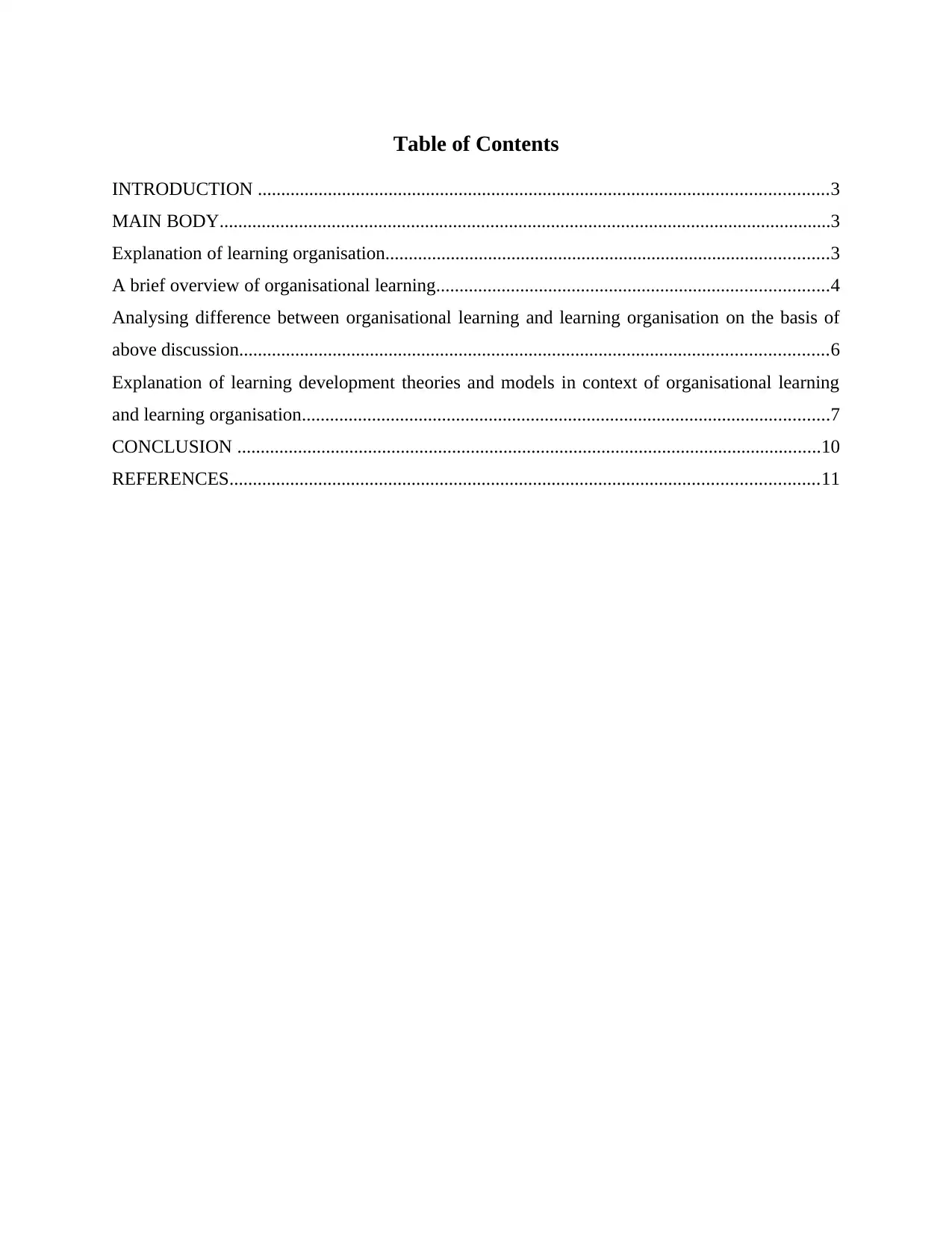
Table of Contents
INTRODUCTION ..........................................................................................................................3
MAIN BODY...................................................................................................................................3
Explanation of learning organisation...............................................................................................3
A brief overview of organisational learning....................................................................................4
Analysing difference between organisational learning and learning organisation on the basis of
above discussion..............................................................................................................................6
Explanation of learning development theories and models in context of organisational learning
and learning organisation.................................................................................................................7
CONCLUSION .............................................................................................................................10
REFERENCES..............................................................................................................................11
INTRODUCTION ..........................................................................................................................3
MAIN BODY...................................................................................................................................3
Explanation of learning organisation...............................................................................................3
A brief overview of organisational learning....................................................................................4
Analysing difference between organisational learning and learning organisation on the basis of
above discussion..............................................................................................................................6
Explanation of learning development theories and models in context of organisational learning
and learning organisation.................................................................................................................7
CONCLUSION .............................................................................................................................10
REFERENCES..............................................................................................................................11
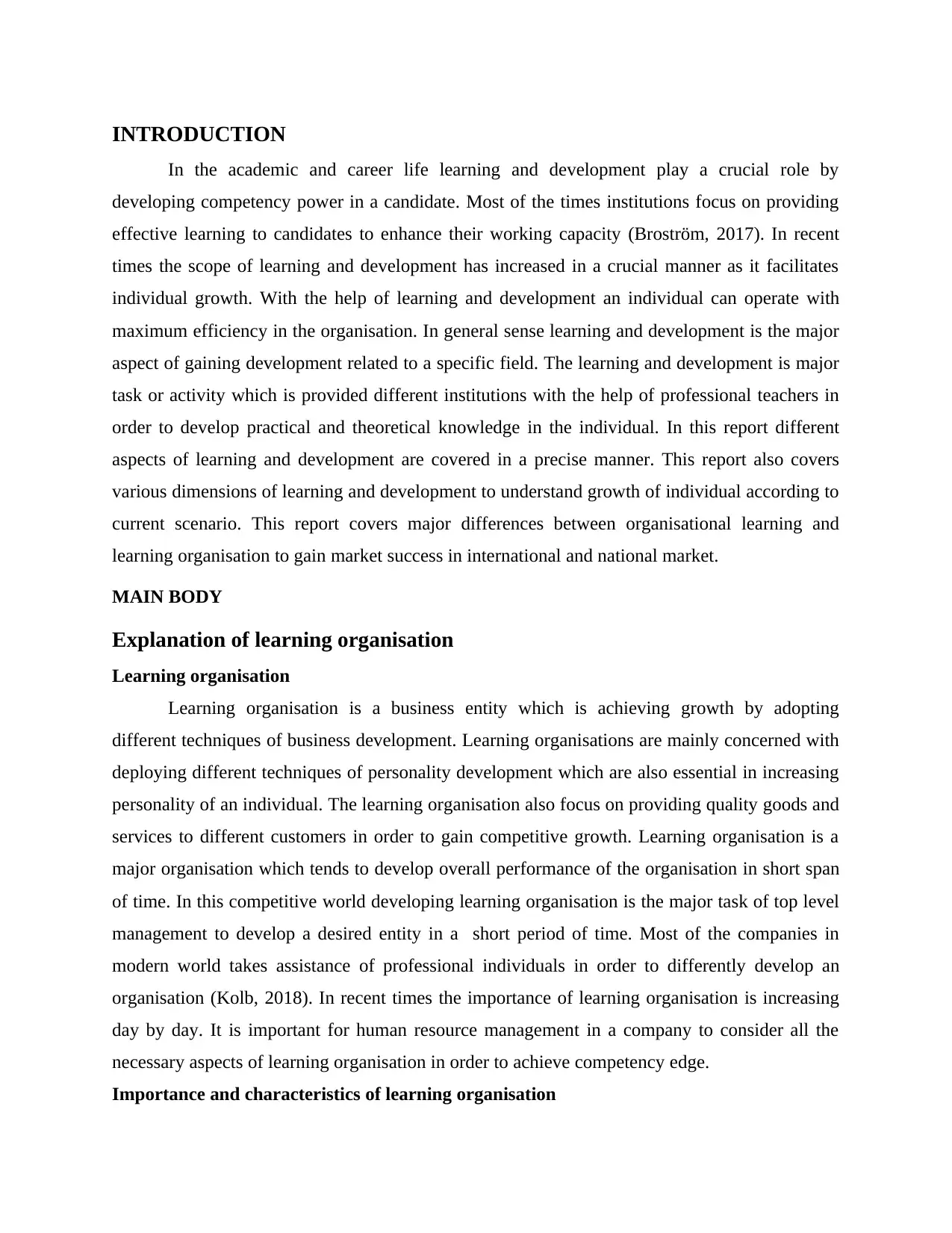
INTRODUCTION
In the academic and career life learning and development play a crucial role by
developing competency power in a candidate. Most of the times institutions focus on providing
effective learning to candidates to enhance their working capacity (Broström, 2017). In recent
times the scope of learning and development has increased in a crucial manner as it facilitates
individual growth. With the help of learning and development an individual can operate with
maximum efficiency in the organisation. In general sense learning and development is the major
aspect of gaining development related to a specific field. The learning and development is major
task or activity which is provided different institutions with the help of professional teachers in
order to develop practical and theoretical knowledge in the individual. In this report different
aspects of learning and development are covered in a precise manner. This report also covers
various dimensions of learning and development to understand growth of individual according to
current scenario. This report covers major differences between organisational learning and
learning organisation to gain market success in international and national market.
MAIN BODY
Explanation of learning organisation
Learning organisation
Learning organisation is a business entity which is achieving growth by adopting
different techniques of business development. Learning organisations are mainly concerned with
deploying different techniques of personality development which are also essential in increasing
personality of an individual. The learning organisation also focus on providing quality goods and
services to different customers in order to gain competitive growth. Learning organisation is a
major organisation which tends to develop overall performance of the organisation in short span
of time. In this competitive world developing learning organisation is the major task of top level
management to develop a desired entity in a short period of time. Most of the companies in
modern world takes assistance of professional individuals in order to differently develop an
organisation (Kolb, 2018). In recent times the importance of learning organisation is increasing
day by day. It is important for human resource management in a company to consider all the
necessary aspects of learning organisation in order to achieve competency edge.
Importance and characteristics of learning organisation
In the academic and career life learning and development play a crucial role by
developing competency power in a candidate. Most of the times institutions focus on providing
effective learning to candidates to enhance their working capacity (Broström, 2017). In recent
times the scope of learning and development has increased in a crucial manner as it facilitates
individual growth. With the help of learning and development an individual can operate with
maximum efficiency in the organisation. In general sense learning and development is the major
aspect of gaining development related to a specific field. The learning and development is major
task or activity which is provided different institutions with the help of professional teachers in
order to develop practical and theoretical knowledge in the individual. In this report different
aspects of learning and development are covered in a precise manner. This report also covers
various dimensions of learning and development to understand growth of individual according to
current scenario. This report covers major differences between organisational learning and
learning organisation to gain market success in international and national market.
MAIN BODY
Explanation of learning organisation
Learning organisation
Learning organisation is a business entity which is achieving growth by adopting
different techniques of business development. Learning organisations are mainly concerned with
deploying different techniques of personality development which are also essential in increasing
personality of an individual. The learning organisation also focus on providing quality goods and
services to different customers in order to gain competitive growth. Learning organisation is a
major organisation which tends to develop overall performance of the organisation in short span
of time. In this competitive world developing learning organisation is the major task of top level
management to develop a desired entity in a short period of time. Most of the companies in
modern world takes assistance of professional individuals in order to differently develop an
organisation (Kolb, 2018). In recent times the importance of learning organisation is increasing
day by day. It is important for human resource management in a company to consider all the
necessary aspects of learning organisation in order to achieve competency edge.
Importance and characteristics of learning organisation
⊘ This is a preview!⊘
Do you want full access?
Subscribe today to unlock all pages.

Trusted by 1+ million students worldwide
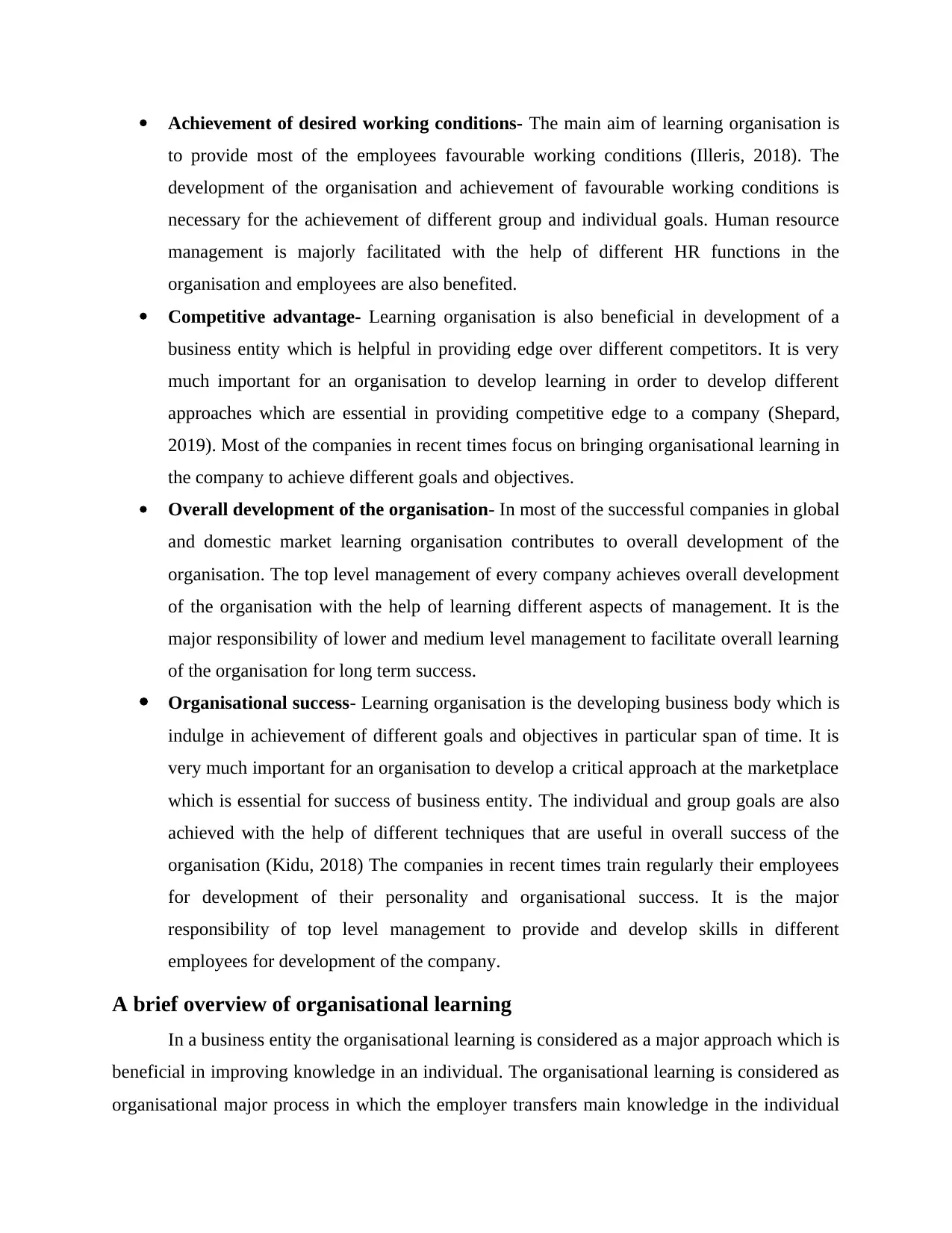
Achievement of desired working conditions- The main aim of learning organisation is
to provide most of the employees favourable working conditions (Illeris, 2018). The
development of the organisation and achievement of favourable working conditions is
necessary for the achievement of different group and individual goals. Human resource
management is majorly facilitated with the help of different HR functions in the
organisation and employees are also benefited.
Competitive advantage- Learning organisation is also beneficial in development of a
business entity which is helpful in providing edge over different competitors. It is very
much important for an organisation to develop learning in order to develop different
approaches which are essential in providing competitive edge to a company (Shepard,
2019). Most of the companies in recent times focus on bringing organisational learning in
the company to achieve different goals and objectives.
Overall development of the organisation- In most of the successful companies in global
and domestic market learning organisation contributes to overall development of the
organisation. The top level management of every company achieves overall development
of the organisation with the help of learning different aspects of management. It is the
major responsibility of lower and medium level management to facilitate overall learning
of the organisation for long term success.
Organisational success- Learning organisation is the developing business body which is
indulge in achievement of different goals and objectives in particular span of time. It is
very much important for an organisation to develop a critical approach at the marketplace
which is essential for success of business entity. The individual and group goals are also
achieved with the help of different techniques that are useful in overall success of the
organisation (Kidu, 2018) The companies in recent times train regularly their employees
for development of their personality and organisational success. It is the major
responsibility of top level management to provide and develop skills in different
employees for development of the company.
A brief overview of organisational learning
In a business entity the organisational learning is considered as a major approach which is
beneficial in improving knowledge in an individual. The organisational learning is considered as
organisational major process in which the employer transfers main knowledge in the individual
to provide most of the employees favourable working conditions (Illeris, 2018). The
development of the organisation and achievement of favourable working conditions is
necessary for the achievement of different group and individual goals. Human resource
management is majorly facilitated with the help of different HR functions in the
organisation and employees are also benefited.
Competitive advantage- Learning organisation is also beneficial in development of a
business entity which is helpful in providing edge over different competitors. It is very
much important for an organisation to develop learning in order to develop different
approaches which are essential in providing competitive edge to a company (Shepard,
2019). Most of the companies in recent times focus on bringing organisational learning in
the company to achieve different goals and objectives.
Overall development of the organisation- In most of the successful companies in global
and domestic market learning organisation contributes to overall development of the
organisation. The top level management of every company achieves overall development
of the organisation with the help of learning different aspects of management. It is the
major responsibility of lower and medium level management to facilitate overall learning
of the organisation for long term success.
Organisational success- Learning organisation is the developing business body which is
indulge in achievement of different goals and objectives in particular span of time. It is
very much important for an organisation to develop a critical approach at the marketplace
which is essential for success of business entity. The individual and group goals are also
achieved with the help of different techniques that are useful in overall success of the
organisation (Kidu, 2018) The companies in recent times train regularly their employees
for development of their personality and organisational success. It is the major
responsibility of top level management to provide and develop skills in different
employees for development of the company.
A brief overview of organisational learning
In a business entity the organisational learning is considered as a major approach which is
beneficial in improving knowledge in an individual. The organisational learning is considered as
organisational major process in which the employer transfers main knowledge in the individual
Paraphrase This Document
Need a fresh take? Get an instant paraphrase of this document with our AI Paraphraser
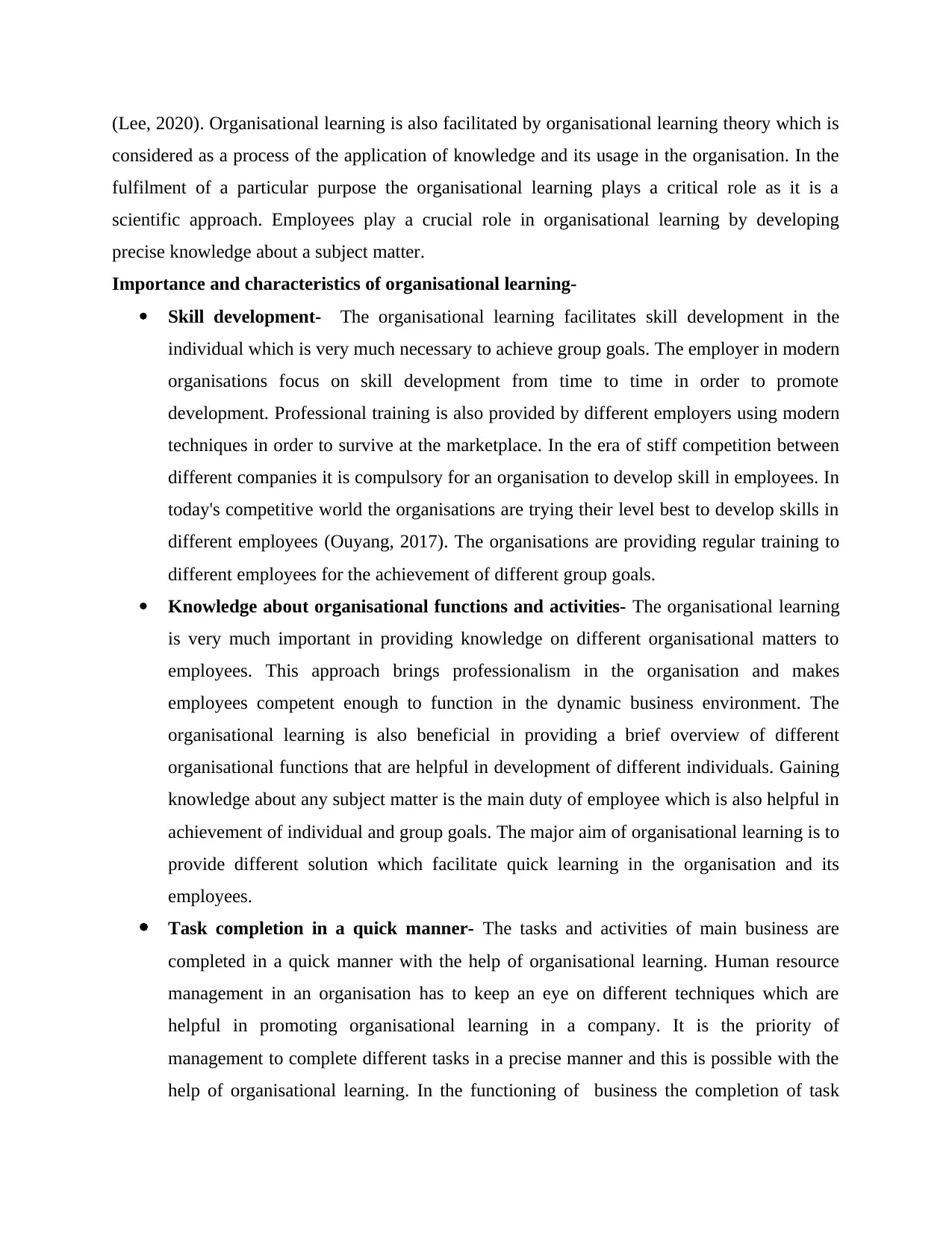
(Lee, 2020). Organisational learning is also facilitated by organisational learning theory which is
considered as a process of the application of knowledge and its usage in the organisation. In the
fulfilment of a particular purpose the organisational learning plays a critical role as it is a
scientific approach. Employees play a crucial role in organisational learning by developing
precise knowledge about a subject matter.
Importance and characteristics of organisational learning-
Skill development- The organisational learning facilitates skill development in the
individual which is very much necessary to achieve group goals. The employer in modern
organisations focus on skill development from time to time in order to promote
development. Professional training is also provided by different employers using modern
techniques in order to survive at the marketplace. In the era of stiff competition between
different companies it is compulsory for an organisation to develop skill in employees. In
today's competitive world the organisations are trying their level best to develop skills in
different employees (Ouyang, 2017). The organisations are providing regular training to
different employees for the achievement of different group goals.
Knowledge about organisational functions and activities- The organisational learning
is very much important in providing knowledge on different organisational matters to
employees. This approach brings professionalism in the organisation and makes
employees competent enough to function in the dynamic business environment. The
organisational learning is also beneficial in providing a brief overview of different
organisational functions that are helpful in development of different individuals. Gaining
knowledge about any subject matter is the main duty of employee which is also helpful in
achievement of individual and group goals. The major aim of organisational learning is to
provide different solution which facilitate quick learning in the organisation and its
employees.
Task completion in a quick manner- The tasks and activities of main business are
completed in a quick manner with the help of organisational learning. Human resource
management in an organisation has to keep an eye on different techniques which are
helpful in promoting organisational learning in a company. It is the priority of
management to complete different tasks in a precise manner and this is possible with the
help of organisational learning. In the functioning of business the completion of task
considered as a process of the application of knowledge and its usage in the organisation. In the
fulfilment of a particular purpose the organisational learning plays a critical role as it is a
scientific approach. Employees play a crucial role in organisational learning by developing
precise knowledge about a subject matter.
Importance and characteristics of organisational learning-
Skill development- The organisational learning facilitates skill development in the
individual which is very much necessary to achieve group goals. The employer in modern
organisations focus on skill development from time to time in order to promote
development. Professional training is also provided by different employers using modern
techniques in order to survive at the marketplace. In the era of stiff competition between
different companies it is compulsory for an organisation to develop skill in employees. In
today's competitive world the organisations are trying their level best to develop skills in
different employees (Ouyang, 2017). The organisations are providing regular training to
different employees for the achievement of different group goals.
Knowledge about organisational functions and activities- The organisational learning
is very much important in providing knowledge on different organisational matters to
employees. This approach brings professionalism in the organisation and makes
employees competent enough to function in the dynamic business environment. The
organisational learning is also beneficial in providing a brief overview of different
organisational functions that are helpful in development of different individuals. Gaining
knowledge about any subject matter is the main duty of employee which is also helpful in
achievement of individual and group goals. The major aim of organisational learning is to
provide different solution which facilitate quick learning in the organisation and its
employees.
Task completion in a quick manner- The tasks and activities of main business are
completed in a quick manner with the help of organisational learning. Human resource
management in an organisation has to keep an eye on different techniques which are
helpful in promoting organisational learning in a company. It is the priority of
management to complete different tasks in a precise manner and this is possible with the
help of organisational learning. In the functioning of business the completion of task
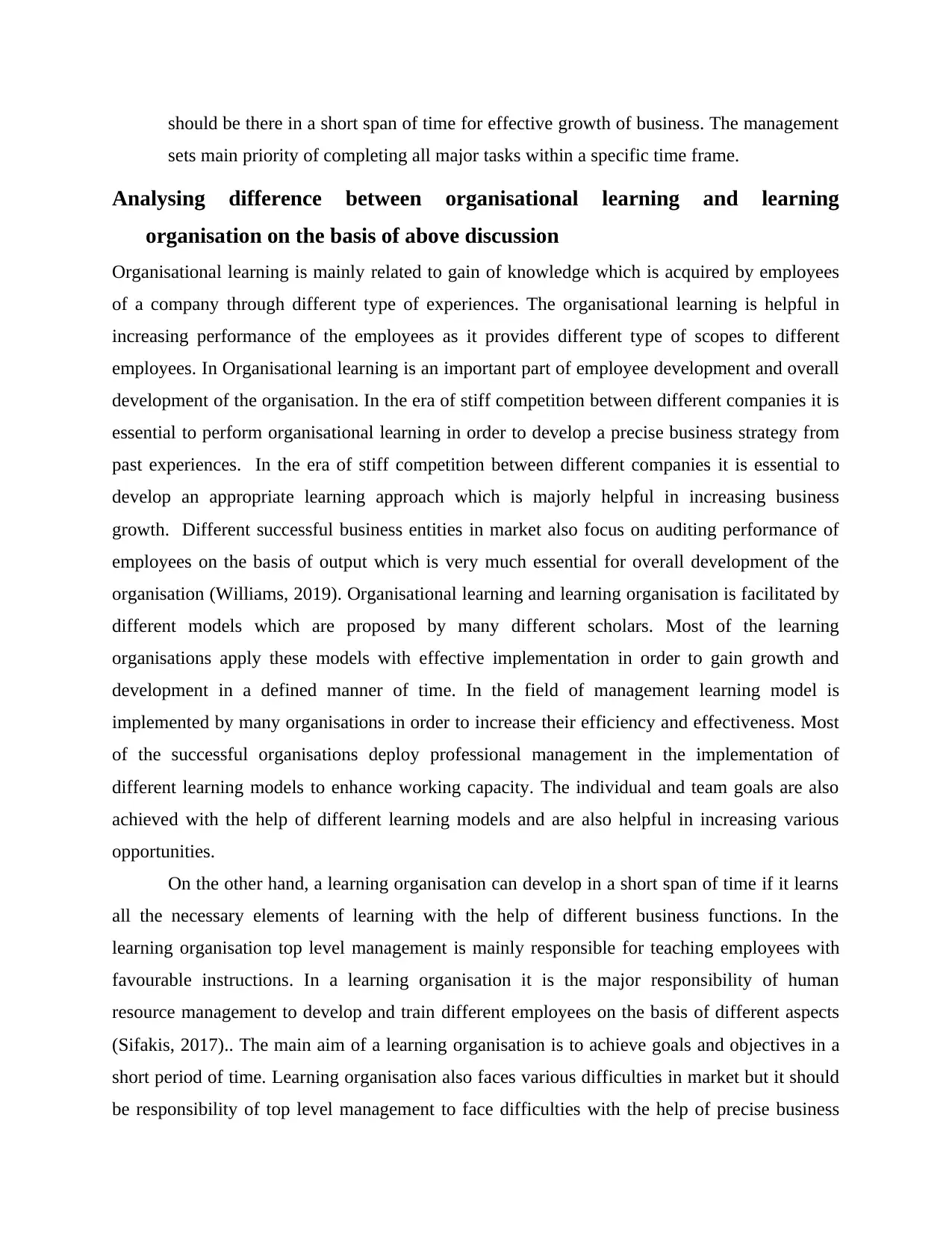
should be there in a short span of time for effective growth of business. The management
sets main priority of completing all major tasks within a specific time frame.
Analysing difference between organisational learning and learning
organisation on the basis of above discussion
Organisational learning is mainly related to gain of knowledge which is acquired by employees
of a company through different type of experiences. The organisational learning is helpful in
increasing performance of the employees as it provides different type of scopes to different
employees. In Organisational learning is an important part of employee development and overall
development of the organisation. In the era of stiff competition between different companies it is
essential to perform organisational learning in order to develop a precise business strategy from
past experiences. In the era of stiff competition between different companies it is essential to
develop an appropriate learning approach which is majorly helpful in increasing business
growth. Different successful business entities in market also focus on auditing performance of
employees on the basis of output which is very much essential for overall development of the
organisation (Williams, 2019). Organisational learning and learning organisation is facilitated by
different models which are proposed by many different scholars. Most of the learning
organisations apply these models with effective implementation in order to gain growth and
development in a defined manner of time. In the field of management learning model is
implemented by many organisations in order to increase their efficiency and effectiveness. Most
of the successful organisations deploy professional management in the implementation of
different learning models to enhance working capacity. The individual and team goals are also
achieved with the help of different learning models and are also helpful in increasing various
opportunities.
On the other hand, a learning organisation can develop in a short span of time if it learns
all the necessary elements of learning with the help of different business functions. In the
learning organisation top level management is mainly responsible for teaching employees with
favourable instructions. In a learning organisation it is the major responsibility of human
resource management to develop and train different employees on the basis of different aspects
(Sifakis, 2017).. The main aim of a learning organisation is to achieve goals and objectives in a
short period of time. Learning organisation also faces various difficulties in market but it should
be responsibility of top level management to face difficulties with the help of precise business
sets main priority of completing all major tasks within a specific time frame.
Analysing difference between organisational learning and learning
organisation on the basis of above discussion
Organisational learning is mainly related to gain of knowledge which is acquired by employees
of a company through different type of experiences. The organisational learning is helpful in
increasing performance of the employees as it provides different type of scopes to different
employees. In Organisational learning is an important part of employee development and overall
development of the organisation. In the era of stiff competition between different companies it is
essential to perform organisational learning in order to develop a precise business strategy from
past experiences. In the era of stiff competition between different companies it is essential to
develop an appropriate learning approach which is majorly helpful in increasing business
growth. Different successful business entities in market also focus on auditing performance of
employees on the basis of output which is very much essential for overall development of the
organisation (Williams, 2019). Organisational learning and learning organisation is facilitated by
different models which are proposed by many different scholars. Most of the learning
organisations apply these models with effective implementation in order to gain growth and
development in a defined manner of time. In the field of management learning model is
implemented by many organisations in order to increase their efficiency and effectiveness. Most
of the successful organisations deploy professional management in the implementation of
different learning models to enhance working capacity. The individual and team goals are also
achieved with the help of different learning models and are also helpful in increasing various
opportunities.
On the other hand, a learning organisation can develop in a short span of time if it learns
all the necessary elements of learning with the help of different business functions. In the
learning organisation top level management is mainly responsible for teaching employees with
favourable instructions. In a learning organisation it is the major responsibility of human
resource management to develop and train different employees on the basis of different aspects
(Sifakis, 2017).. The main aim of a learning organisation is to achieve goals and objectives in a
short period of time. Learning organisation also faces various difficulties in market but it should
be responsibility of top level management to face difficulties with the help of precise business
⊘ This is a preview!⊘
Do you want full access?
Subscribe today to unlock all pages.

Trusted by 1+ million students worldwide
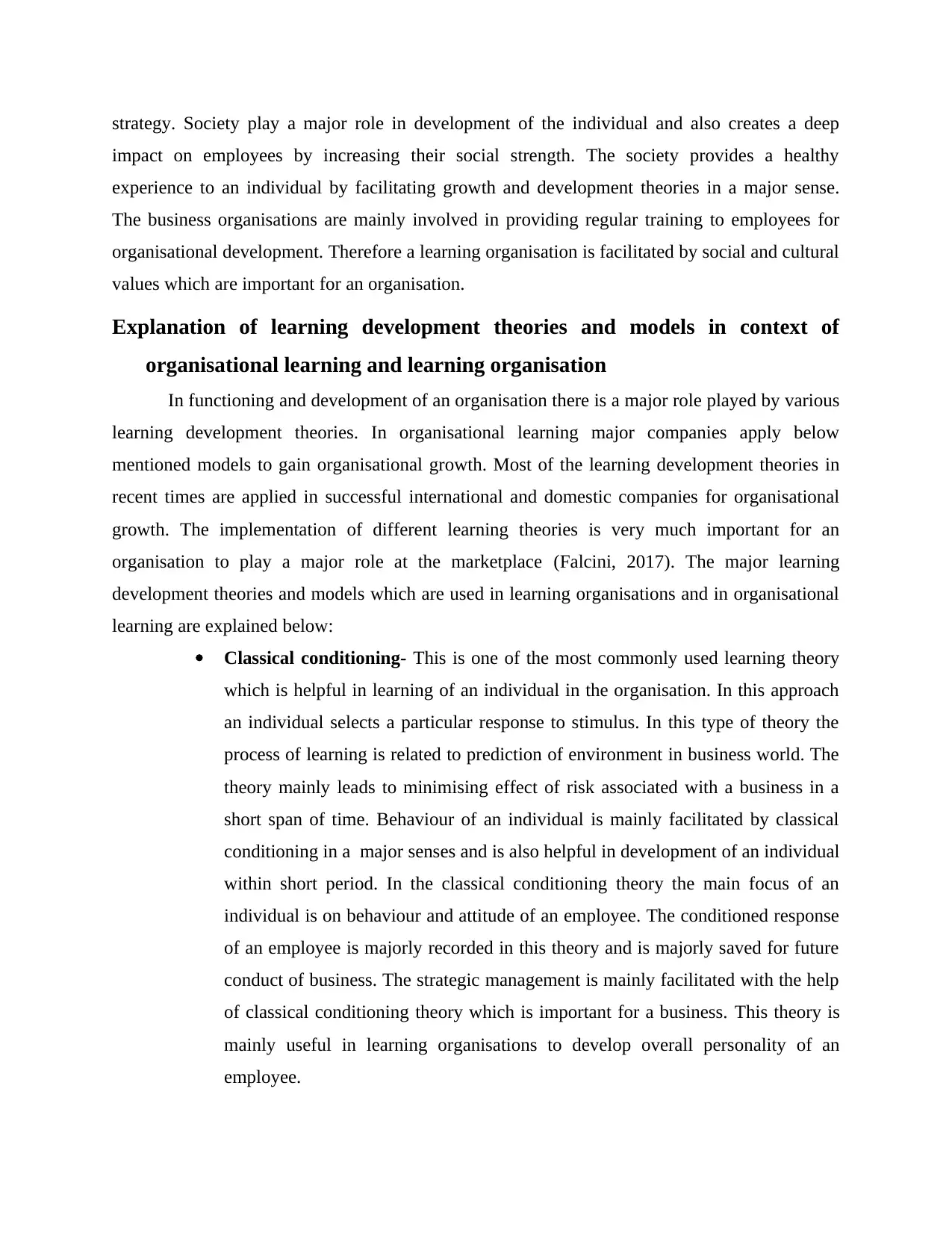
strategy. Society play a major role in development of the individual and also creates a deep
impact on employees by increasing their social strength. The society provides a healthy
experience to an individual by facilitating growth and development theories in a major sense.
The business organisations are mainly involved in providing regular training to employees for
organisational development. Therefore a learning organisation is facilitated by social and cultural
values which are important for an organisation.
Explanation of learning development theories and models in context of
organisational learning and learning organisation
In functioning and development of an organisation there is a major role played by various
learning development theories. In organisational learning major companies apply below
mentioned models to gain organisational growth. Most of the learning development theories in
recent times are applied in successful international and domestic companies for organisational
growth. The implementation of different learning theories is very much important for an
organisation to play a major role at the marketplace (Falcini, 2017). The major learning
development theories and models which are used in learning organisations and in organisational
learning are explained below:
Classical conditioning- This is one of the most commonly used learning theory
which is helpful in learning of an individual in the organisation. In this approach
an individual selects a particular response to stimulus. In this type of theory the
process of learning is related to prediction of environment in business world. The
theory mainly leads to minimising effect of risk associated with a business in a
short span of time. Behaviour of an individual is mainly facilitated by classical
conditioning in a major senses and is also helpful in development of an individual
within short period. In the classical conditioning theory the main focus of an
individual is on behaviour and attitude of an employee. The conditioned response
of an employee is majorly recorded in this theory and is majorly saved for future
conduct of business. The strategic management is mainly facilitated with the help
of classical conditioning theory which is important for a business. This theory is
mainly useful in learning organisations to develop overall personality of an
employee.
impact on employees by increasing their social strength. The society provides a healthy
experience to an individual by facilitating growth and development theories in a major sense.
The business organisations are mainly involved in providing regular training to employees for
organisational development. Therefore a learning organisation is facilitated by social and cultural
values which are important for an organisation.
Explanation of learning development theories and models in context of
organisational learning and learning organisation
In functioning and development of an organisation there is a major role played by various
learning development theories. In organisational learning major companies apply below
mentioned models to gain organisational growth. Most of the learning development theories in
recent times are applied in successful international and domestic companies for organisational
growth. The implementation of different learning theories is very much important for an
organisation to play a major role at the marketplace (Falcini, 2017). The major learning
development theories and models which are used in learning organisations and in organisational
learning are explained below:
Classical conditioning- This is one of the most commonly used learning theory
which is helpful in learning of an individual in the organisation. In this approach
an individual selects a particular response to stimulus. In this type of theory the
process of learning is related to prediction of environment in business world. The
theory mainly leads to minimising effect of risk associated with a business in a
short span of time. Behaviour of an individual is mainly facilitated by classical
conditioning in a major senses and is also helpful in development of an individual
within short period. In the classical conditioning theory the main focus of an
individual is on behaviour and attitude of an employee. The conditioned response
of an employee is majorly recorded in this theory and is majorly saved for future
conduct of business. The strategic management is mainly facilitated with the help
of classical conditioning theory which is important for a business. This theory is
mainly useful in learning organisations to develop overall personality of an
employee.
Paraphrase This Document
Need a fresh take? Get an instant paraphrase of this document with our AI Paraphraser
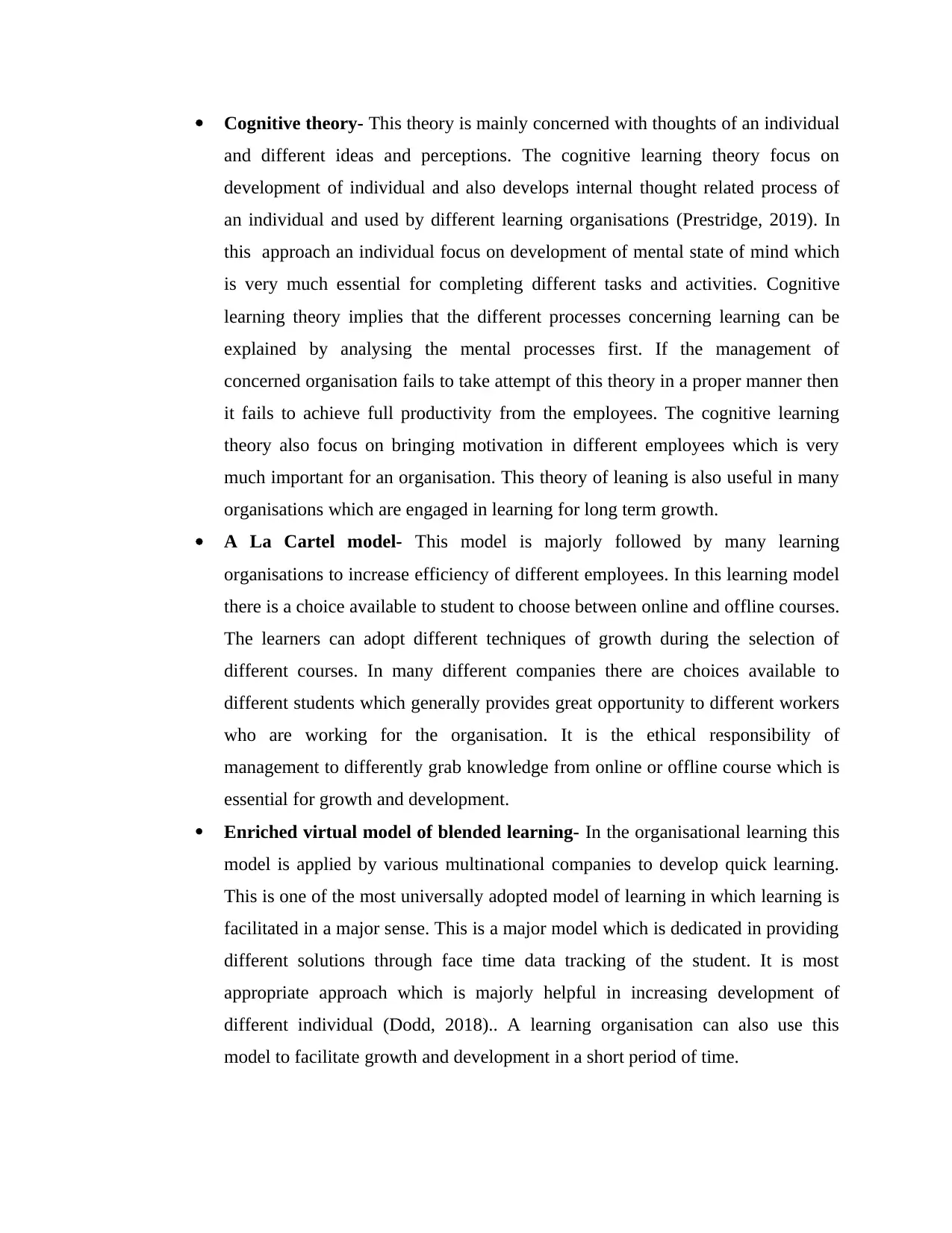
Cognitive theory- This theory is mainly concerned with thoughts of an individual
and different ideas and perceptions. The cognitive learning theory focus on
development of individual and also develops internal thought related process of
an individual and used by different learning organisations (Prestridge, 2019). In
this approach an individual focus on development of mental state of mind which
is very much essential for completing different tasks and activities. Cognitive
learning theory implies that the different processes concerning learning can be
explained by analysing the mental processes first. If the management of
concerned organisation fails to take attempt of this theory in a proper manner then
it fails to achieve full productivity from the employees. The cognitive learning
theory also focus on bringing motivation in different employees which is very
much important for an organisation. This theory of leaning is also useful in many
organisations which are engaged in learning for long term growth.
A La Cartel model- This model is majorly followed by many learning
organisations to increase efficiency of different employees. In this learning model
there is a choice available to student to choose between online and offline courses.
The learners can adopt different techniques of growth during the selection of
different courses. In many different companies there are choices available to
different students which generally provides great opportunity to different workers
who are working for the organisation. It is the ethical responsibility of
management to differently grab knowledge from online or offline course which is
essential for growth and development.
Enriched virtual model of blended learning- In the organisational learning this
model is applied by various multinational companies to develop quick learning.
This is one of the most universally adopted model of learning in which learning is
facilitated in a major sense. This is a major model which is dedicated in providing
different solutions through face time data tracking of the student. It is most
appropriate approach which is majorly helpful in increasing development of
different individual (Dodd, 2018).. A learning organisation can also use this
model to facilitate growth and development in a short period of time.
and different ideas and perceptions. The cognitive learning theory focus on
development of individual and also develops internal thought related process of
an individual and used by different learning organisations (Prestridge, 2019). In
this approach an individual focus on development of mental state of mind which
is very much essential for completing different tasks and activities. Cognitive
learning theory implies that the different processes concerning learning can be
explained by analysing the mental processes first. If the management of
concerned organisation fails to take attempt of this theory in a proper manner then
it fails to achieve full productivity from the employees. The cognitive learning
theory also focus on bringing motivation in different employees which is very
much important for an organisation. This theory of leaning is also useful in many
organisations which are engaged in learning for long term growth.
A La Cartel model- This model is majorly followed by many learning
organisations to increase efficiency of different employees. In this learning model
there is a choice available to student to choose between online and offline courses.
The learners can adopt different techniques of growth during the selection of
different courses. In many different companies there are choices available to
different students which generally provides great opportunity to different workers
who are working for the organisation. It is the ethical responsibility of
management to differently grab knowledge from online or offline course which is
essential for growth and development.
Enriched virtual model of blended learning- In the organisational learning this
model is applied by various multinational companies to develop quick learning.
This is one of the most universally adopted model of learning in which learning is
facilitated in a major sense. This is a major model which is dedicated in providing
different solutions through face time data tracking of the student. It is most
appropriate approach which is majorly helpful in increasing development of
different individual (Dodd, 2018).. A learning organisation can also use this
model to facilitate growth and development in a short period of time.
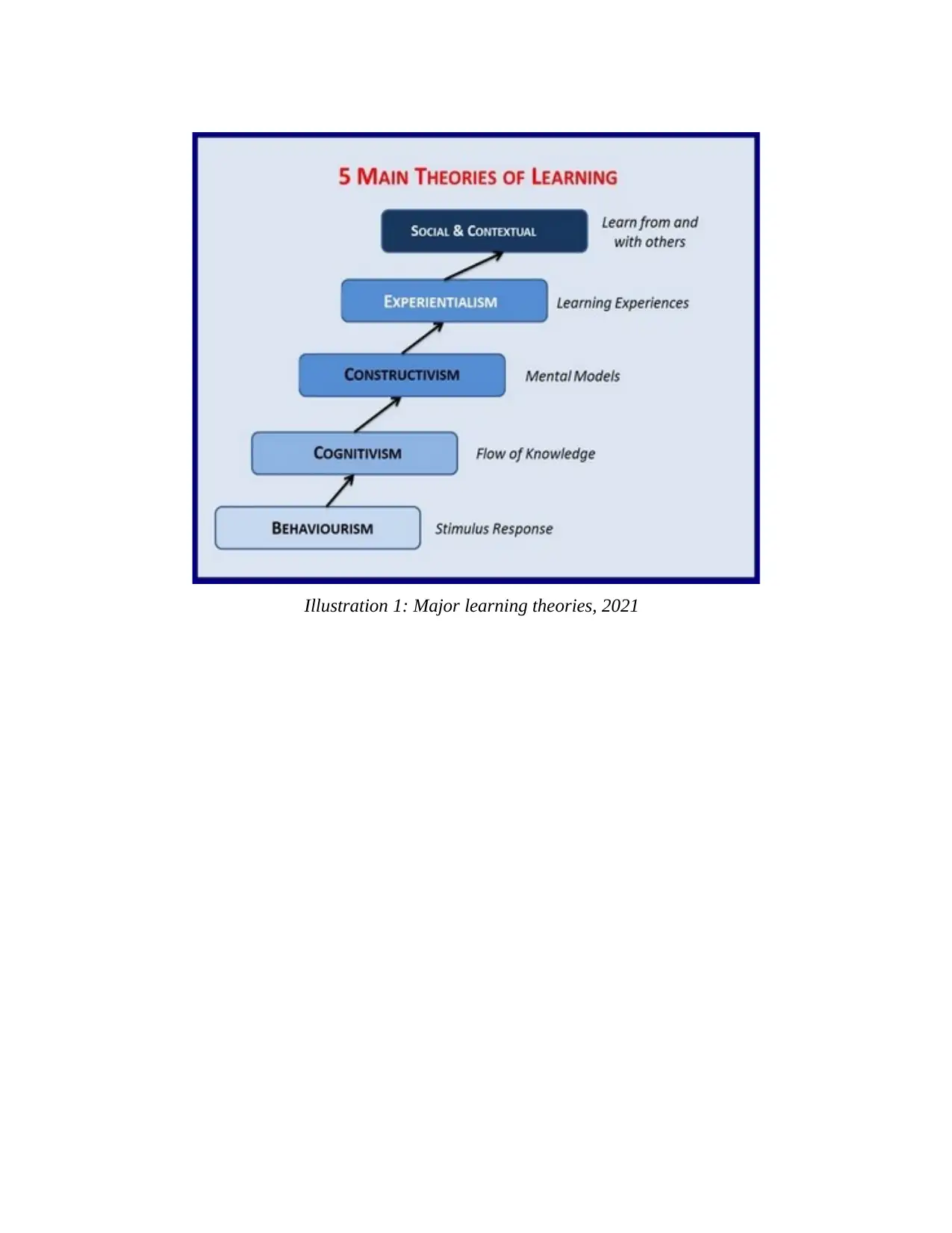
Illustration 1: Major learning theories, 2021
⊘ This is a preview!⊘
Do you want full access?
Subscribe today to unlock all pages.

Trusted by 1+ million students worldwide
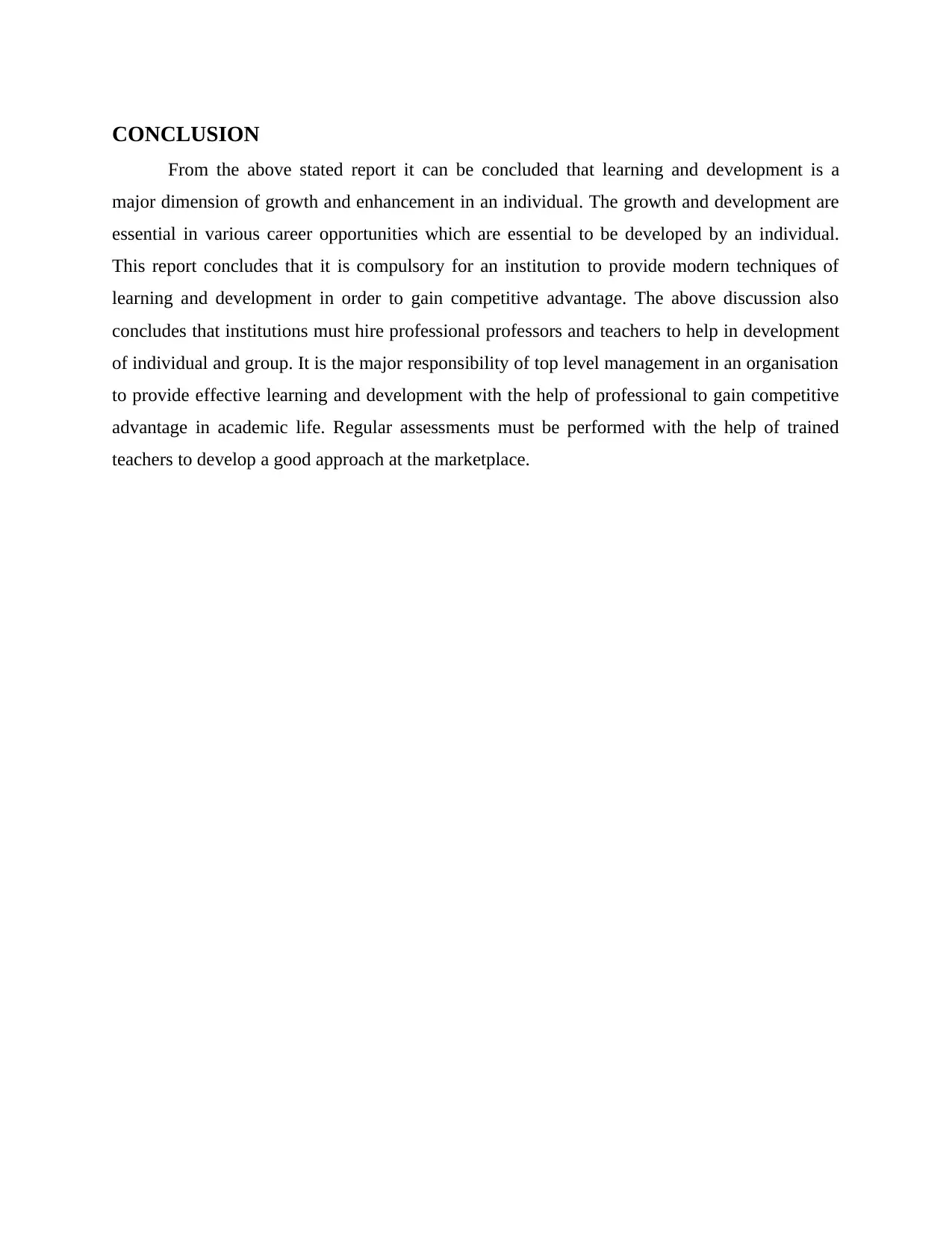
CONCLUSION
From the above stated report it can be concluded that learning and development is a
major dimension of growth and enhancement in an individual. The growth and development are
essential in various career opportunities which are essential to be developed by an individual.
This report concludes that it is compulsory for an institution to provide modern techniques of
learning and development in order to gain competitive advantage. The above discussion also
concludes that institutions must hire professional professors and teachers to help in development
of individual and group. It is the major responsibility of top level management in an organisation
to provide effective learning and development with the help of professional to gain competitive
advantage in academic life. Regular assessments must be performed with the help of trained
teachers to develop a good approach at the marketplace.
From the above stated report it can be concluded that learning and development is a
major dimension of growth and enhancement in an individual. The growth and development are
essential in various career opportunities which are essential to be developed by an individual.
This report concludes that it is compulsory for an institution to provide modern techniques of
learning and development in order to gain competitive advantage. The above discussion also
concludes that institutions must hire professional professors and teachers to help in development
of individual and group. It is the major responsibility of top level management in an organisation
to provide effective learning and development with the help of professional to gain competitive
advantage in academic life. Regular assessments must be performed with the help of trained
teachers to develop a good approach at the marketplace.
Paraphrase This Document
Need a fresh take? Get an instant paraphrase of this document with our AI Paraphraser
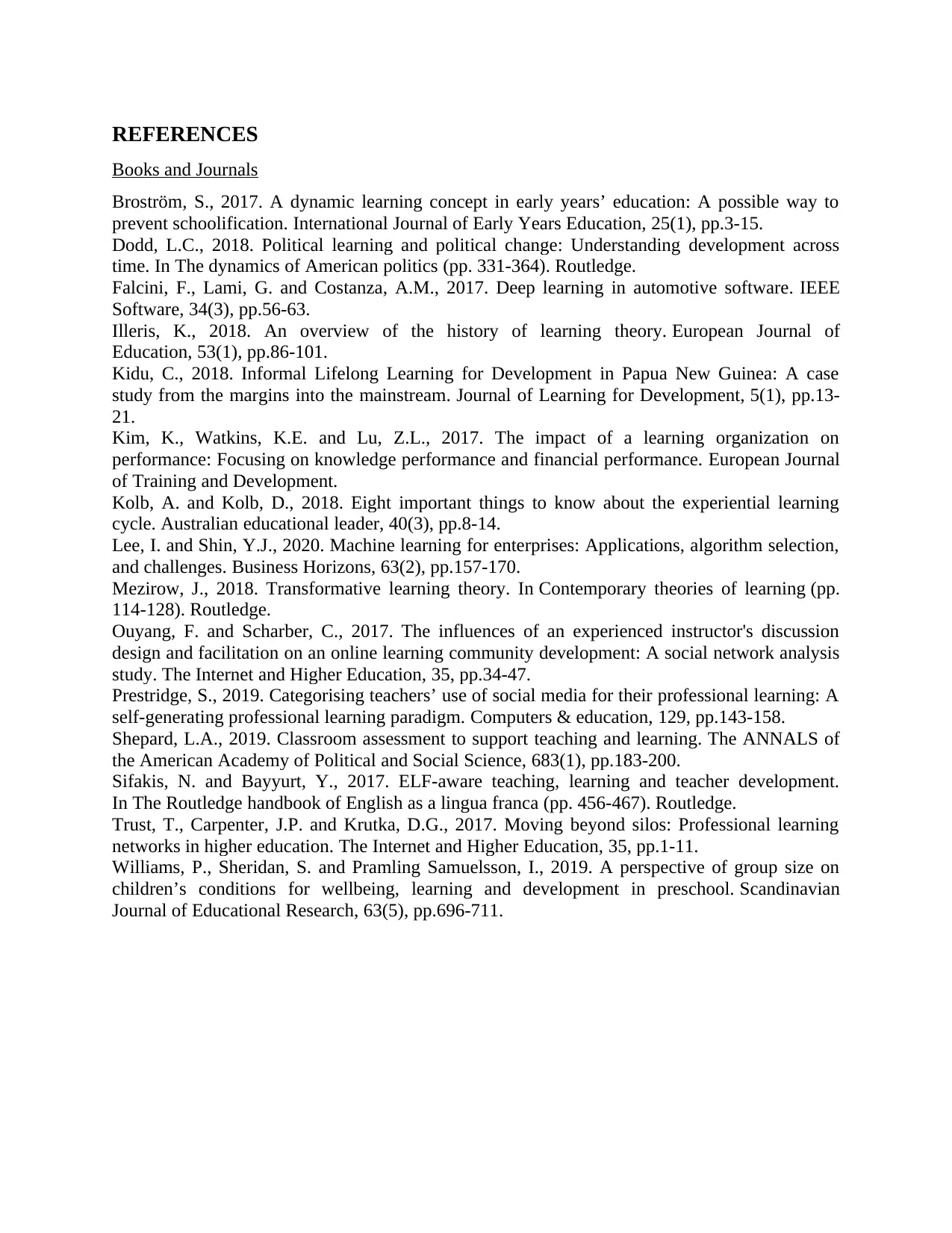
REFERENCES
Books and Journals
Broström, S., 2017. A dynamic learning concept in early years’ education: A possible way to
prevent schoolification. International Journal of Early Years Education, 25(1), pp.3-15.
Dodd, L.C., 2018. Political learning and political change: Understanding development across
time. In The dynamics of American politics (pp. 331-364). Routledge.
Falcini, F., Lami, G. and Costanza, A.M., 2017. Deep learning in automotive software. IEEE
Software, 34(3), pp.56-63.
Illeris, K., 2018. An overview of the history of learning theory. European Journal of
Education, 53(1), pp.86-101.
Kidu, C., 2018. Informal Lifelong Learning for Development in Papua New Guinea: A case
study from the margins into the mainstream. Journal of Learning for Development, 5(1), pp.13-
21.
Kim, K., Watkins, K.E. and Lu, Z.L., 2017. The impact of a learning organization on
performance: Focusing on knowledge performance and financial performance. European Journal
of Training and Development.
Kolb, A. and Kolb, D., 2018. Eight important things to know about the experiential learning
cycle. Australian educational leader, 40(3), pp.8-14.
Lee, I. and Shin, Y.J., 2020. Machine learning for enterprises: Applications, algorithm selection,
and challenges. Business Horizons, 63(2), pp.157-170.
Mezirow, J., 2018. Transformative learning theory. In Contemporary theories of learning (pp.
114-128). Routledge.
Ouyang, F. and Scharber, C., 2017. The influences of an experienced instructor's discussion
design and facilitation on an online learning community development: A social network analysis
study. The Internet and Higher Education, 35, pp.34-47.
Prestridge, S., 2019. Categorising teachers’ use of social media for their professional learning: A
self-generating professional learning paradigm. Computers & education, 129, pp.143-158.
Shepard, L.A., 2019. Classroom assessment to support teaching and learning. The ANNALS of
the American Academy of Political and Social Science, 683(1), pp.183-200.
Sifakis, N. and Bayyurt, Y., 2017. ELF-aware teaching, learning and teacher development.
In The Routledge handbook of English as a lingua franca (pp. 456-467). Routledge.
Trust, T., Carpenter, J.P. and Krutka, D.G., 2017. Moving beyond silos: Professional learning
networks in higher education. The Internet and Higher Education, 35, pp.1-11.
Williams, P., Sheridan, S. and Pramling Samuelsson, I., 2019. A perspective of group size on
children’s conditions for wellbeing, learning and development in preschool. Scandinavian
Journal of Educational Research, 63(5), pp.696-711.
Books and Journals
Broström, S., 2017. A dynamic learning concept in early years’ education: A possible way to
prevent schoolification. International Journal of Early Years Education, 25(1), pp.3-15.
Dodd, L.C., 2018. Political learning and political change: Understanding development across
time. In The dynamics of American politics (pp. 331-364). Routledge.
Falcini, F., Lami, G. and Costanza, A.M., 2017. Deep learning in automotive software. IEEE
Software, 34(3), pp.56-63.
Illeris, K., 2018. An overview of the history of learning theory. European Journal of
Education, 53(1), pp.86-101.
Kidu, C., 2018. Informal Lifelong Learning for Development in Papua New Guinea: A case
study from the margins into the mainstream. Journal of Learning for Development, 5(1), pp.13-
21.
Kim, K., Watkins, K.E. and Lu, Z.L., 2017. The impact of a learning organization on
performance: Focusing on knowledge performance and financial performance. European Journal
of Training and Development.
Kolb, A. and Kolb, D., 2018. Eight important things to know about the experiential learning
cycle. Australian educational leader, 40(3), pp.8-14.
Lee, I. and Shin, Y.J., 2020. Machine learning for enterprises: Applications, algorithm selection,
and challenges. Business Horizons, 63(2), pp.157-170.
Mezirow, J., 2018. Transformative learning theory. In Contemporary theories of learning (pp.
114-128). Routledge.
Ouyang, F. and Scharber, C., 2017. The influences of an experienced instructor's discussion
design and facilitation on an online learning community development: A social network analysis
study. The Internet and Higher Education, 35, pp.34-47.
Prestridge, S., 2019. Categorising teachers’ use of social media for their professional learning: A
self-generating professional learning paradigm. Computers & education, 129, pp.143-158.
Shepard, L.A., 2019. Classroom assessment to support teaching and learning. The ANNALS of
the American Academy of Political and Social Science, 683(1), pp.183-200.
Sifakis, N. and Bayyurt, Y., 2017. ELF-aware teaching, learning and teacher development.
In The Routledge handbook of English as a lingua franca (pp. 456-467). Routledge.
Trust, T., Carpenter, J.P. and Krutka, D.G., 2017. Moving beyond silos: Professional learning
networks in higher education. The Internet and Higher Education, 35, pp.1-11.
Williams, P., Sheridan, S. and Pramling Samuelsson, I., 2019. A perspective of group size on
children’s conditions for wellbeing, learning and development in preschool. Scandinavian
Journal of Educational Research, 63(5), pp.696-711.

⊘ This is a preview!⊘
Do you want full access?
Subscribe today to unlock all pages.

Trusted by 1+ million students worldwide
1 out of 13
Related Documents
Your All-in-One AI-Powered Toolkit for Academic Success.
+13062052269
info@desklib.com
Available 24*7 on WhatsApp / Email
![[object Object]](/_next/static/media/star-bottom.7253800d.svg)
Unlock your academic potential
Copyright © 2020–2025 A2Z Services. All Rights Reserved. Developed and managed by ZUCOL.



